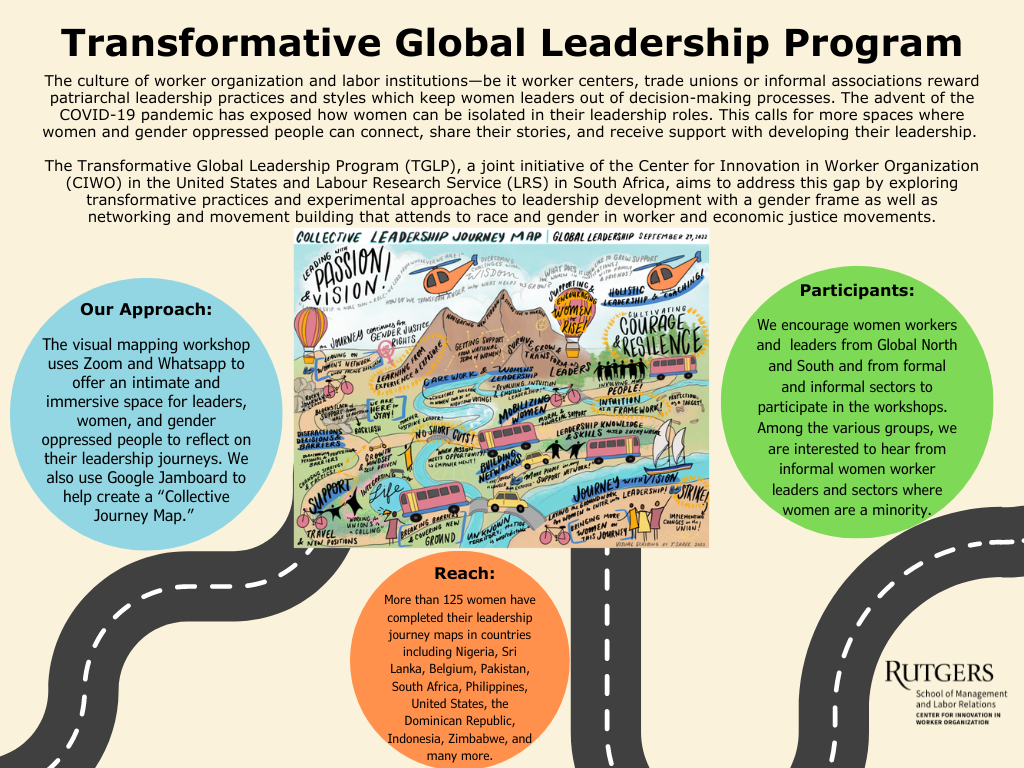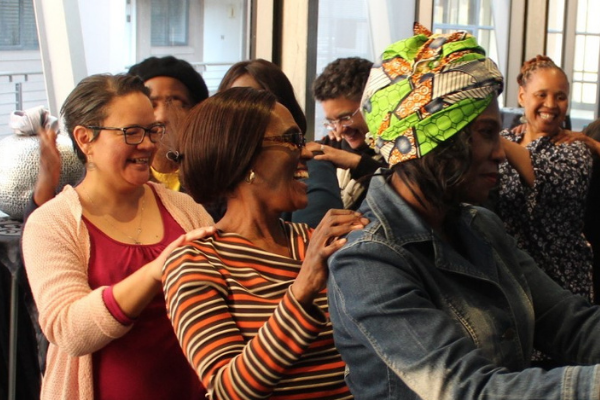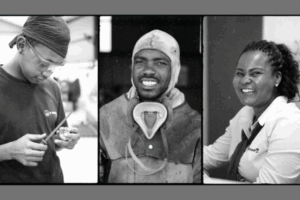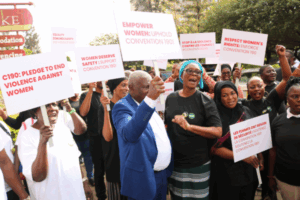"We see instances of our constituencies critically reflecting on their own practices, for example, recognising that a struggle for collective agreements reflecting 'gender demands' must include a struggle for changes in individual consciousness and behaviour, resource allocation and, importantly, organisational culture."
Nina Benjamin | Project Leader of Gender Equality Programme of the Labour Research Service (LRS).
How we define gender equality
“Gender equality refers to the enjoyment of equal rights, opportunities and treatment by women, girls and boys in all aspects of the life cycle. Gender equality in the world of work consists of two complementary elements: equality of opportunity and equality of treatment.” ~ILO/LRS (Handbook on Mainstreaming Gender Equality into Decent Work, Country Programmes in Africa )
The LRS goes beyond this definition and works with the feminist theoretical analysis and approach of intersectionality, which takes into account multiple overlapping and intersecting forms of discrimination, oppression and exploitation, including classism, racism, sexism, ablism, homophobia, transphobia and ageism.
How we define gender mainstreaming
We understand gender mainstreaming as a strategy for achieving gender equality in which the concerns and experiences of women and men are taken into account when designing, implementing and evaluating our work. We recognise that a gender mainstreaming strategy can be implemented in a very “box-ticking” manner, focusing on outputs, for example, the number of women and men, and the number of gender workshops or policies implemented, without seeing the wider process of change that includes both individual behaviour and systemic cultural change.
Our work is influenced by the Gender at Work framework, which highlights the interrelationship between gender equality, organisational change and institutions or ‘rules of the game’ maintained by power dynamics. We have therefore framed our work as ‘creating cultures of gender equality’ rather than gender mainstreaming.
How we create a culture of gender equality at LRS and in our work networks
In all the work that we do, we try to take into account the needs and concerns of our staff and our constituents in relation to their different identities and power relations. An example of this would be recognising the specific needs of LGBTQ+ workers and older and younger women workers.
To a greater or lesser extent, our programmes operate from a feminist epistemology in which subjectivity, emotion and embodiment are valued.
How focusing on gender equality affects LRS staff and constituents
We work to dismantle the patriarchal private-public binary. Changes in all aspects of our lives as staff and constituents are at the heart of our monitoring and evaluation. Staff have space to share work experiences and challenges in a way that not only considers how we think and act, but allows for emotions to be expressed.
We work with Singleton’s “head, heart, and hands” model for transformative learning.
The ‘Head, Heart and Hands’ model is part of our work with constituencies, so that even in our discussions about, for example, policy or collective agreements, which are usually associated with the head (ideas) and hands (action), we use methods that open space for the heart (emotions) to emerge. This has strengthened our partnerships, particularly with groups who feel marginalised and without a voice, such as women in precarious forms of employment and young LGBTQ+ people in search of employment. They report that they feel they are able to bring their ‘whole’ selves, with all their identities, into the educational spaces we create, because in these spaces their presence is valued and participants are encouraged to use all their senses as part of the learning process.
Also, we aim to maintain this sense of working with the “whole” person when producing resources and online materials, such as the LRS Negotiator’s Guide, which has sections referring to the head, heart, hands/feet model.
The positive changes we can see regarding gender equality
In our organisation: LRS recognises that we are all connected. The relationships that develop from our daily interactions are key to creating a culture of gender equality in the organisation. We are not perfect, but we do strive to be aware of the power we hold as men and women, as people of different sexual orientations and gender identities, ages, races, classes, nationalities and physical abilities.
Our constituencies and work networks: In shaping our engagement with our constituencies, our internal processes are important. We see instances of constituencies critically reflecting on their own practices, for example, recognising that a struggle for collective agreements reflecting ‘gender demands’ must include a struggle for changes in individual consciousness and behaviour, resource allocation and, importantly, organisational culture. This is a slow process of recognising and mobilising around not only what appear to be the “obvious” demands, such as wages, but also giving value to what are seen as the “soft” issues of dignity, safety and security. An example of this is the support that LRS has given to the affiliates of Education International (EI) in their struggle to eradicate gender-based violence in schools in Africa.
"Organisations have embraced inclusivity and gender equality in the various countries where we provide training on gender equality and women's leadership. Trade union leaders are involved and committed. This is evidenced by the commitments they have made to women's development and participation and the inclusion of women in senior leadership positions."
Nina Benjamin, LRS Gender Equality Programme
Legislation and policies: LRS has worked with trade unions in the process of ratifying ILO Conventions 189 and 190. Both conventions strengthen the power of women workers in particular. South Africa has ratified both Conventions and in some cases has amended some domestic legislation to bring it into line with the Conventions. However, ensuring that the rights conferred by these Conventions and related domestic legislation are implemented remains an ongoing challenge.
Our role in bringing about change in organisations
LRS is a labour support organisation. In line with our mission, our role is to walk alongside trade unions and civil society organisations. We support the organising, advocacy and mobilisation work of organisations by providing research, education and resources. We work in partnership with various donor organisations whose funding enables us to create spaces for reflecting and experimenting on ways of strengthening our work of creating cultures of gender equality. Some of the projects have a central focus on ‘building cultures of gender equality‘. Other projects use a gender lens in the planning, implementation and evaluation process.
How we can improve gender equality in our organisations
In our context, inequities are found in everything we do and say. Gender-based violence is structural where unequal power relations has made violence, and particularly violence related to gender, a part of the everyday existence. We find that to address any aspect of unequal gender relations – we need to respond to different forms of GBV. The changes need to happen both individually and systemically.
The impact of the Covid-19 pandemic on our approach to gender equality
With the COVID pandemic, we moved to more online engagement and some of this has continued. The shift to more online engagement was a challenge as well as an opportunity for our work on creating of cultures of gender equality. Before the pandemic, almost all of our gender equality education and action research had been face-to-face. This allowed us to experiment with different embodied practices. Staying true to our feminist pedagogy, we began to experiment with ways of creating head/heard/hands online spaces. This was met with varying degrees of success, as the participants who came to the online spaces faced the usual challenges of connectivity, but also, as mostly women workers, the added challenge of balancing care work with other work responsibilities.
Our work now often takes a more hybrid form. We use online spaces to support our face-to-face engagement, or vice versa. In our experience, more women workers are now feeling more empowered to work with technology and are less likely to feel overwhelmed when there are problems with connectivity.
We also now have some gender equality programmes that are entirely online and this has been an opportunity for us to have regular engagement with women all over the world.
Having consistent partners is invaluable during difficult times. We are able to share our experiences of creating gender equality with different organisations.
What gender policies or strategies does LRS have?
- Conditions of Employment, which includes parental rights
- Employment Equity
- Sexual Harassment
- Gender Policy
Insights into our work
Trade unions in our working networks in the various countries we provide training on gender equality and women’s leadership have embraced inclusivity and gender equality. Union leaders are more involved and committed. This is evidenced by, for example, organisations increasingly embracing issues they have rejected in the past and redefining transformative leadership. This demonstrates our influence in working towards culture change and transformational strategies.
In Africa, facilitators in Gender-Responsive Education Sector Planning (GRESP) can influence training programmes as a result of our training work to promote transformative leadership. GRESP aims to mainstream and promote gender equality throughout education systems.

10 women trade union leaders (from Education International affiliates in South Africa, Kenya, Uganda and Ghana; AFL-CIO affiliates and a trade union consultant in Nigeria) expressed a sense of individual empowerment by creating stories describing their individual leadership journeys. The engagement took place in an online workshop using our new online tool, developed in partnership with members of the Center for Innovation in Worker Organization (CIWO) at Rutgers University, to provide a more participatory approach to renewing women’s transformative leadership. The CIWO team has more nuanced strategies for connecting and building relationships with women leaders in Africa as a result of our participation in the project.
Women leaders in the Academic and Professional Staff Association Union (APSA) are inspired to incorporate feminist principles, values and approaches into the policies and activities of the union. As ‘feminist labour experts’, LRS designed and facilitated two training sessions with women leaders in APSA in partnership with JASS Associates, a feminist movement-building organisation.
Zambian Science Granting Council members participating in a Gender Action Learning Programme developed a set of feminist strategies to promote and support girls’ and women’s recruitment and sustained participation in science and technology. We supported an 18-month programme to promote gender and inclusivity in Science Granting Councils in Africa, in partnership with Gender at Work and the Human Science Research Council.
We provided online and offline learning spaces to FEDUSA and COSATU, to women and marginalised workers and their trade unions, and to young job seekers and members of the community to prevent and respond to GBV.
- COSATU and FEDUSA affiliates use LRS resources in the planning of organisational gender strategies and collective bargaining demands.
- Newly elected members of the gender committee have a greater understanding of the commitments in FEDUSA’s Congress resolution on securing LGBTI rights in the world of work. The federation’s gender structures also have ideas and actions to put the resolution into practice.
- Trade unions are increasingly using the ILO Convention 190 (C190) as a tool to raise awareness among workers about the rights of workers who are LGBT to have a safe and inclusive workplace.
- A core group of LGBTI rights activists at UNTU have developed ideas for strengthening the union’s LGBTI rights work.
- Letsema organisation and young LGBT members of Letsema, together with FEDUSA and affiliate UNTU, have strategies for protecting LGBTI workers and young job seekers from discrimination and violence.
Education unions have the urgency to bargain remuneration and conditions of service of Volunteer Food Handlers at the Education Labour Relations Council and the Public Service Co-ordinating Bargaining Council.
We mentored 185 adolescent girls and young women from 15 African countries to mobilise decision-makers to advance successful HIV prevention and elimination of gender-based violence and harmful norms. Through online training over a period of three months, the participants increased are better equipped to lead advocacy on effective HIV prevention interventions for girls and young women in their countries.
"As a result of the training, I am an effective leader with a voice and experience to contribute to the response to the HIV epidemic and gender inequality in my community. I have a better understanding of how to work with community and institutional structures to promote the rights and well-being of adolescent girls and young women. The training has also enabled me to develop a peer support network that will strengthen me in advocacy."
Participant in the training
The Southern African Clothing and Textile Workers’ Union workers and union officials, who are part of a group participating in the LRS and Solidarity Centre’s participatory action research project for preventing and addressing GBVH in the global clothing garment manufacturing sector and the supply chain, can identify themselves as researchers, conduct semi-structured interviews and record cases of gender-based violence and harassment.
Domestic workers’ organisations have intensified their advocacy for access to the Unemployment Insurance Fund (UIF) and the Compensation for Injuries and Diseases Act (COIDA) to ensure that all workers are covered for future crises.
“The workshops have made it easier for SADSAWU to approach the labour department to get information about the UIF and COIDA and to help register more of our members. This is because we have had contact with officials from the department at the LRS-facilitated workshops. Also, some of the resources used to facilitate the workshops are great tools for teaching effective organising and our officials now use them.”
Richard Njenjema, Organiser at SADSAWU.







